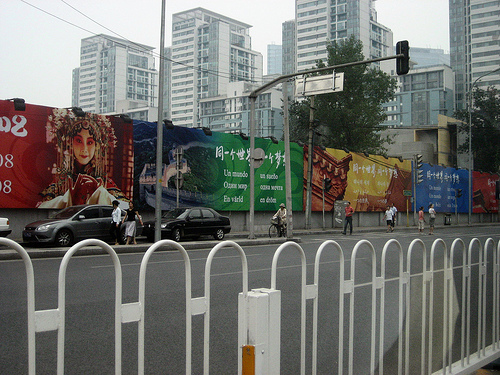Athletes, journalists, and world dignitaries were greeted with a thick white haze yesterday and today as they descended upon Beijing for the start of the Olympic Games. Much to the Ministry of Environmental Protection’s chagrin, the weather has not delivered the "clear and blue" skies as promised when Beijing was awarded the games. However, as CTV reported, today’s haze may not be as bad as it looks. According to a Canadian Olympic Committee climatologist, Doug Charko, such fog is generated by heavy humidity as opposed to intense levels of pollution. Beijing today was a balmy 30 degrees Celsius with 85 percent humidity.
Nevertheless, The Wall Street Journal’s blog the China Journal reports an Air Pollution Index for Aug. 7 of 95 with a primary pollutant of particulate matter 10 (PM10). PM10 consists of "inhalable coarse particles" that are between 2.5 and 10 micrometers in diameter, according to the U.S. EPA. The API is a 500 point scale that the Chinese government uses to measure air quality. In China a reading of 100 is considered "slightly polluted" while any reading below is considered safe. The U.S. EPA considers a reading of 100 to be unhealthy for "sensitive groups." The U.S. also takes ozone and PM2.5 into account in its Air Quality Index which China presently does not.
Thursday: Beijing had an API of 95:

Though one would be hard-pressed to describe the air quality in Beijing as “good,” athletes have thus far found it tolerable. In a guest post for China Journal, Jason Read of the U.S. men’s rowing team remarked on the improving air quality:
Some good news: the weather and air quality have improved substantially over the past week. The readings of the state’s pollution meter readings have confirmed a steady improvement in particulate matter. The recalcitrant haze and smog appear to be abating. Our lungs have not been heavy or burning as they were the first few days while training.
Masks have not been spotted among the athletes since the U.S. cyclists deplaned in Beijing’s airport sporting the USOC sanctioned masks and then apologized for wearing them. As the games progress, it remains to be seen if more athletes will adopt the masks duing off-hours that are generally designed not to be worn during competition
Wednesday: Beijing had an API of 85:

For those interested in following China’s air quality during the Olympics, there is a widget on China Journal that allows one to scan Beijing’s API for the past three years as well as get a daily reading. Click “detailed view” in the “Beijing Air Quality box.”

